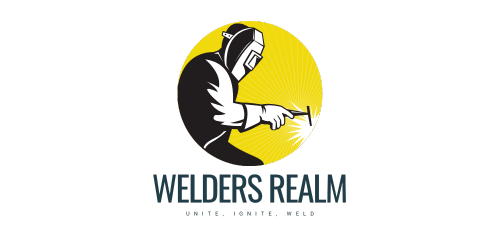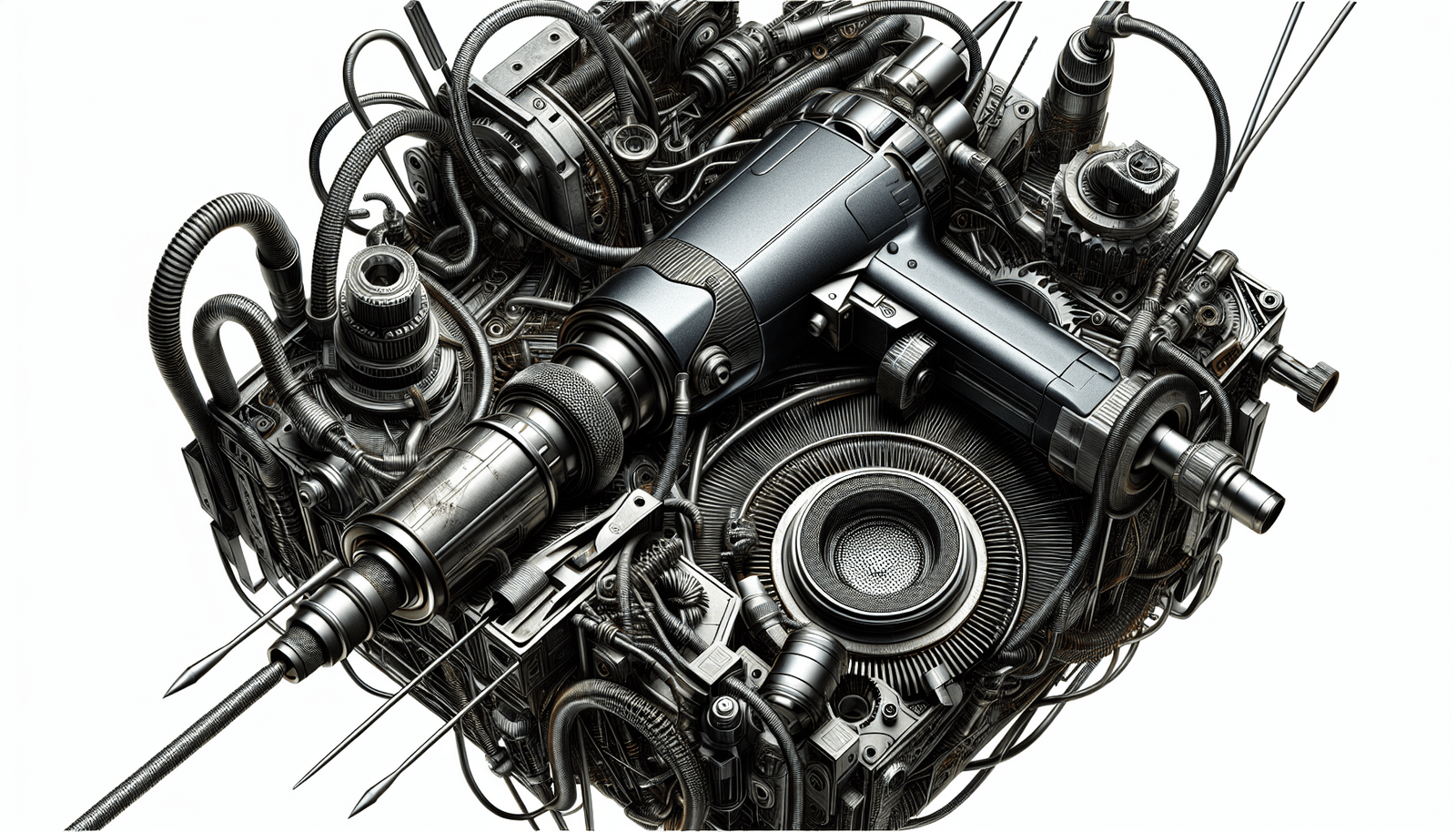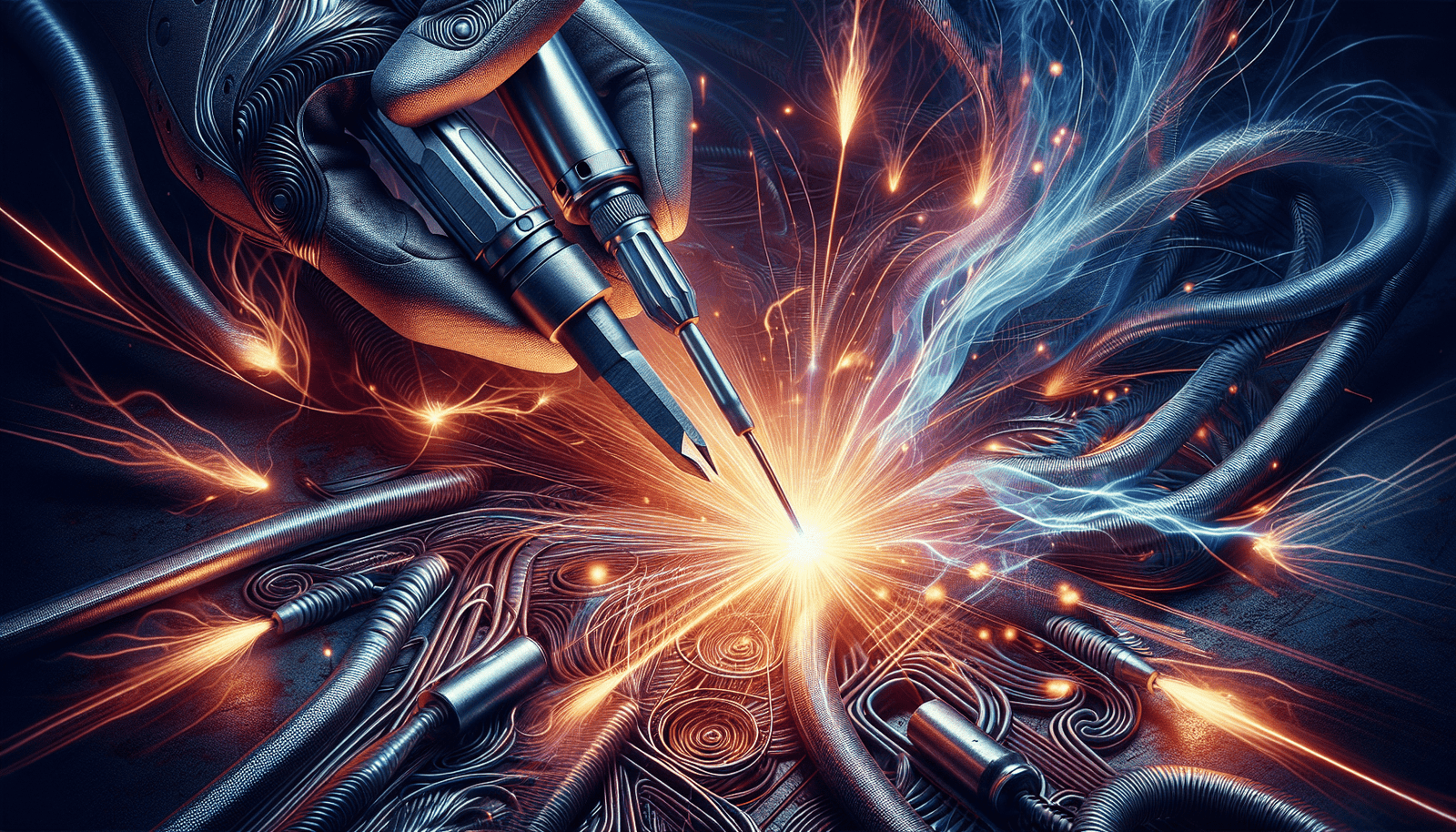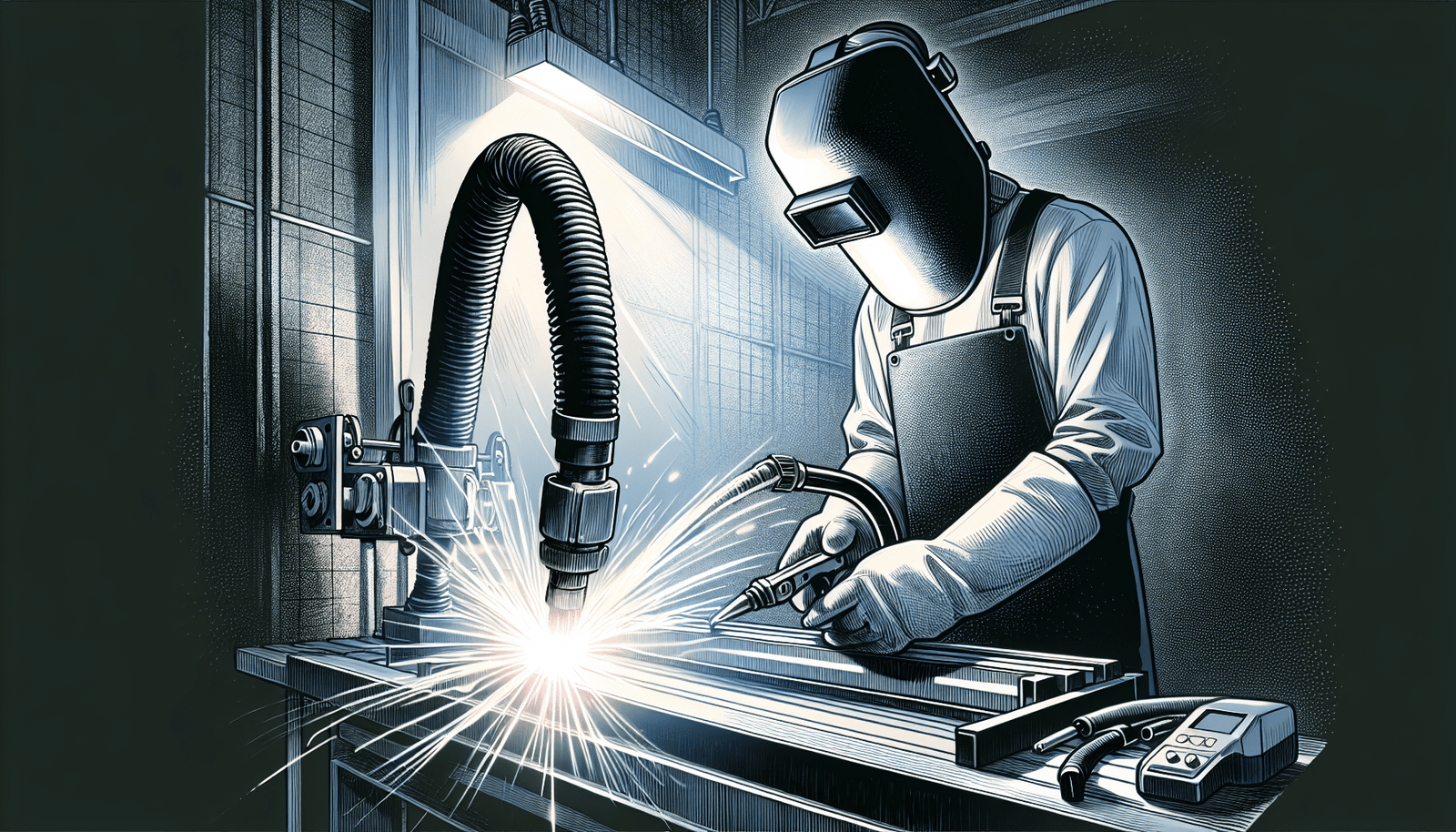Looking to learn more about industrial equipment repair? In this article, we’ve gathered frequently asked questions to give you a better understanding of this topic. Whether you’re a welding guru or simply someone in search of welding product reviews, we’ve got you covered. Written in a friendly and approachable tone, this content aims to provide easy-to-understand answers to common questions. From the basics of industrial equipment repair to tips for finding quality products online, we’ve got all the information you need. So, let’s dive in and explore the world of industrial equipment repair!
What is Industrial Equipment Repair?
Definition of Industrial Equipment Repair
Industrial equipment repair refers to the process of repairing and maintaining various types of machinery and equipment used in industries such as manufacturing, construction, and mining. This includes fixing issues, performing preventive maintenance, and ensuring the safe and efficient functioning of the equipment.
Importance of Industrial Equipment Repair
Industrial equipment repair plays a crucial role in maintaining the productivity and profitability of various industries. Regular maintenance and timely repairs help extend the lifespan of equipment, minimize downtime, and avoid costly breakdowns. By addressing issues promptly, businesses can ensure that their equipment operates at optimal levels, maximizing efficiency and minimizing the risk of accidents or malfunctions.
Common Industries that require Industrial Equipment Repair
Numerous industries rely on industrial equipment repair to keep their operations running smoothly. Some common industries that frequently require equipment repair services include:
Manufacturing: Manufacturers rely on a wide range of equipment, such as conveyor systems, assembly lines, and industrial robots, all of which may require repairs or maintenance at some point.
Construction: Construction companies heavily depend on heavy machinery, including excavators, bulldozers, cranes, and concrete mixers. Repairing and maintaining these machines is vital to ensure construction projects stay on track.
Mining: The mining industry operates with large-scale equipment such as drills, crushers, loaders, and haul trucks. Repairing and servicing these machines is essential to minimize downtime and keep operations running efficiently.
Energy: Power plants, including nuclear, fossil fuel, and renewable energy facilities, rely on the proper functioning of turbines, boilers, generators, and other specialized machinery. Regular maintenance and repairs are necessary to ensure uninterrupted power generation.
These are just a few examples, but industrial equipment repair is crucial across various sectors where equipment is integral to the smooth running of operations.
What Equipment is Commonly Repaired in the Industrial Sector?
Welding Equipment
Welding equipment, such as welders, plasma cutters, and welding robots, is frequently used in the industrial sector. These tools often require repairs or maintenance due to wear and tear, damaged components, or issues with electrical connections.
Heavy Machinery
Heavy machinery, including excavators, bulldozers, loaders, and cranes, is essential for large-scale construction projects. These machines endure rigorous use, and repairs are often required to address mechanical failures, hydraulic system issues, or electrical malfunctions.
Production Line Machines
In manufacturing plants, production line machines such as conveyor systems, packaging equipment, and automated systems play a crucial role. Regular repairs and maintenance are necessary to minimize downtime and keep production processes running smoothly.
HVAC Systems
Industrial facilities often have extensive HVAC (heating, ventilation, and air conditioning) systems to maintain comfortable working conditions. Repairing HVAC equipment, including chillers, boilers, and ventilation systems, ensures a controlled environment and enables the smooth operation of various industrial processes.
What are the Common Issues that Require Industrial Equipment Repair?
Breakdowns
Equipment breakdowns are one of the most common issues that require industrial equipment repair. These breakdowns can be caused by various factors, including mechanical failures, electrical issues, or component malfunctions. Prompt repairs are crucial to minimize downtime and avoid disruptions to productivity.
Preventive Maintenance
Regular preventive maintenance is essential to identify and address potential issues before they cause major breakdowns. Scheduled inspections, lubrication, cleaning, and calibration of equipment help prevent unnecessary repairs and extend the lifespan of the machinery.
Safety-related issues
Safety is paramount in any industrial setting. Equipment repairs may be necessary to address safety-related issues such as faulty emergency stop mechanisms, malfunctioning safety guards, or electrical hazards. Ensuring the safe operation of equipment protects workers and reduces the risk of accidents.
Performance problems
Industrial equipment may experience performance problems over time. This can include issues such as reduced efficiency, decreased output, or inconsistent operation. Repairs may be required to correct these performance problems and optimize the equipment’s functionality.
Who Performs Industrial Equipment Repair?
In-house maintenance teams
Many industries have in-house maintenance teams that are responsible for repairing and maintaining their equipment. These teams consist of skilled technicians and mechanics who are familiar with the specific machinery used within the organization.
Third-party repair services
Some businesses prefer to outsource their equipment repairs to third-party repair services. These services specialize in industrial equipment repair and have the expertise and resources to handle a wide range of machinery and equipment.
Individual contractors
There are also individual contractors who offer industrial equipment repair services. These contractors may have specialized knowledge in specific types of equipment or industries and provide their services on a freelance or contractual basis.
Specialty repair services
For highly specialized equipment or industries, there are specialty repair services available. These services focus on repairing and maintaining specific types of machinery, such as welding equipment or HVAC systems, and possess the specialized knowledge and tools required for these tasks.
What Skills are Required for Industrial Equipment Repair?
Mechanical skills
Industrial equipment repair requires mechanical aptitude and skills. Technicians must be proficient in handling tools, disassembling and reassembling machinery, and diagnosing mechanical issues accurately. Knowledge of mechanical systems and components is essential for effective repairs.
Troubleshooting abilities
Troubleshooting skills are crucial in industrial equipment repair. Technicians must be able to identify the root causes of equipment malfunctions and diagnose problems efficiently. This includes analyzing electrical circuits, reading schematics, and using diagnostic tools to pinpoint issues.
Technical knowledge
A strong technical knowledge of the specific equipment being repaired is essential. Technicians should understand the operating principles, functions, and intricacies of industrial machinery to perform repairs effectively. This includes staying up-to-date with the latest technological advancements in the field.
Understanding of safety regulations
Industrial equipment repair involves working with potentially hazardous machinery. Technicians must have a comprehensive understanding of safety regulations and protocols to ensure their own safety and the safety of others. Adhering to safety guidelines is vital in preventing accidents and injuries.
How is Industrial Equipment Repair Cost Determined?
Factors influencing repair cost
Several factors influence the cost of industrial equipment repair. These factors include the complexity of the repair, the availability of replacement parts, the extent of the damage, and the location of the equipment. Additionally, highly specialized or rare equipment may require more costly repairs due to the scarcity of parts or expertise.
Tips for cost-effective repairs
To keep repair costs manageable, businesses can consider a few tips:
Regular maintenance: Investing in preventive maintenance can help identify and address issues before they become major repairs, potentially saving on costs.
Proper training: Ensuring that operators and maintenance personnel are properly trained can reduce the risk of equipment damage and minimize the need for extensive repairs.
Timely repairs: Addressing equipment issues promptly can prevent further damage and minimize the extent of repairs required.
Quality components: Using high-quality replacement parts during repairs can lead to more reliable and durable repairs, reducing the likelihood of recurring issues.
Understanding repair estimate
When seeking repair services, it is crucial to understand the repair estimate provided. The estimate should include a breakdown of the expected costs, including labor, replacement parts, and any additional fees. It is advisable to request multiple estimates for comparison and to clarify any uncertainties before proceeding with the repairs.
How Long Does Industrial Equipment Repair Usually Take?
Average repair timeframe
The duration of industrial equipment repairs can vary depending on the complexity of the issue, the availability of replacement parts, and the workload of the repair service. In general, repairs can range from a few hours to several days or even weeks for more extensive overhauls.
Influencing factors for repair duration
Several factors can influence the duration of industrial equipment repairs:
Availability of parts: If replacement parts are readily available, repairs can be completed more quickly. However, if specialized or rare parts need to be sourced, the repair timeframe may be extended.
Complexity of the issue: Complicated issues may require more time to diagnose and repair. In-depth troubleshooting and testing may be necessary to ensure the problem is fully resolved.
Service workload: The workload of the repair service can also impact repair duration. If the service is busy or has a backlog of repairs, it may take longer to schedule and complete the necessary repairs.
Express repair options
For urgent repairs that cannot afford significant downtime, some repair services offer express or expedited repair options. These services prioritize urgent repairs and make every effort to complete the repairs as quickly as possible. However, it is important to note that these options may come with additional costs.
How Often Should Industrial Equipment be Serviced?
Importance of regular maintenance
Regular maintenance is crucial for the optimal performance and longevity of industrial equipment. By scheduling routine service and inspections, businesses can identify potential issues early, address minor problems, and prevent major breakdowns. Regular maintenance also helps ensure compliance with safety regulations and minimizes the risk of accidents.
Scheduling for different types of equipment
The frequency of equipment servicing depends on several factors, including the type of equipment, its usage intensity, and the manufacturer’s recommendations. Some general guidelines for scheduling maintenance are:
Light equipment or low-intensity use: Every 6 to 12 months or based on the manufacturer’s guidelines.
Heavy equipment or high-intensity use: Every 3 to 6 months or as recommended by the manufacturer.
Critical machinery or continuous operation: Regular inspections and maintenance should be performed more frequently, potentially on a monthly or quarterly basis.
It is important to consult the equipment’s manual and follow the manufacturer’s recommended maintenance schedule for optimal results.
Effects of lack of maintenance
Neglecting regular maintenance can have detrimental effects on industrial equipment. Without proper servicing, equipment may experience increased wear and tear, reduced efficiency, and a higher risk of breakdowns or malfunctions. Unaddressed issues can escalate and result in costly repairs, extended downtime, and compromised work processes. Regular maintenance is an investment in the longevity and reliability of industrial equipment.
Are There Different Types of Industrial Equipment Repair?
Preventive maintenance
Preventive maintenance refers to proactive measures taken to prevent equipment failure and minimize the need for repairs. This includes regular inspections, lubrication, cleaning, and the replacement of worn parts before they cause significant issues. Preventive maintenance helps identify and address potential problems while they are still manageable, reducing the risk of breakdowns and improving overall equipment performance.
Corrective maintenance
Corrective maintenance, also known as reactive maintenance, is performed to address issues that have already occurred. This type of repair focuses on fixing equipment failures or malfunctions after they have caused disruptions or downtime. Corrective maintenance aims to restore the equipment to working condition, but it is often more costly and time-consuming than preventive maintenance.
Predictive maintenance
Predictive maintenance involves using data and advanced monitoring techniques to predict potential equipment failures. By analyzing performance data, such as vibrations, temperature, or electrical outputs, technicians can identify patterns that indicate a potential problem. Predictive maintenance allows for timely intervention before failures occur, minimizing downtime and optimizing maintenance efforts.
Emergency maintenance
Emergency maintenance refers to unscheduled repairs required to address critical equipment failure or unexpected breakdowns. This type of repair is typically performed under urgent circumstances to restore operations as quickly as possible. Emergency maintenance prioritizes time-sensitive repairs, often with the goal of getting equipment back up and running within minimal downtime.
How to Choose a Reliable Industrial Equipment Repair Service?
Considerations when hiring
When choosing an industrial equipment repair service, consider the following factors:
Experience and expertise: Look for repair services with extensive experience in repairing the specific type of equipment you need assistance with. Ask for references or case studies to assess their expertise.
Availability and response time: Efficiency is crucial when it comes to equipment repairs. Find out about their availability and their response time to urgent repair requests.
Reputation and customer reviews: Check online reviews and testimonials from previous customers to gauge the reputation and reliability of the repair service. Positive customer feedback is a good indicator of quality service.
Checking credentials
Ensure that the repair service has the necessary licenses and certifications to carry out industrial equipment repairs. Confirm that their technicians are qualified and trained to work on the specific type of equipment you need assistance with. Verifying their credentials ensures that the repairs will be carried out by professionals with the required expertise.
Evaluating customer reviews
Before making a decision, read customer reviews and testimonials to gain insight into the repair service’s reputation. Positive reviews indicate customer satisfaction and reliability, while negative reviews may indicate recurring problems or subpar service. Consider the overall feedback before selecting a repair service.
Comparing quotes
To make an informed decision, obtain quotes from multiple repair services. Compare the pricing, included services, and estimated repair times to evaluate the overall value offered. However, remember that cost should not be the sole determining factor. Consider the repair service’s reputation, expertise, and customer satisfaction when making your final choice.
Choosing a reliable industrial equipment repair service is essential to ensure quality repairs, minimize downtime, and maintain the optimal functioning of your equipment.
In conclusion, industrial equipment repair is vital for the smooth operation of various industries. Understanding the importance of repair, the types of equipment commonly repaired, the skills required for technicians, and how to choose a reliable repair service enables businesses to keep their equipment functioning efficiently and minimize disruptions to their operations. Regular maintenance and timely repairs are key to extending equipment lifespan, optimizing performance, and ensuring a safe working environment. By prioritizing industrial equipment repair, businesses can maximize productivity, reduce downtime, and protect their investment in machinery and equipment.





